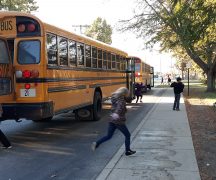By Susan Tebben
A series of bills set to be considered by the Ohio House go after the EdChoice voucher program, look to end academic distress commissions, and enact language meant to hold community schools accountable.
Among the bills referred to the House’s Primary and Secondary Education Committee, House Bill 587, sponsored by state Rep. Phil Robinson, D-Solon, and state Rep. John Patterson, D-Jefferson, would suspend EdChoice scholarships for the 2020-2021 school year. For the following school year, the bill creates two application periods under an “educational choice scholarship pilot program,” according to its language.
The first application period would open between February 1 and July 1, with the second period after July 1.
If the money appropriated by the general assembly runs out in the first application period, no second application period will occur, the bill states.
EdChoice funds are currently frozen at the previous school year’s levels, as passed in an omnibus bill to address coronavirus-related economic needs.
Also headed for committee review is the related issue of academic distress commissions. State Rep. Joe Miller, D-Amherst, and state Rep. Mary Lightbody, D-Westerville, entered a bill that would dissolve all existing academic distress commissions, groups assigned to school districts that receive an overall grade of F on state school report cards for three consecutive years.
House Bill 577 would also “place a moratorium” on the creation of the commissions until at least 2024, and it would establish a “School Transformation Board.”
Academic distress commissions have been a point of contention during the EdChoice debates and the most recent attempt to pass EdChoice legislation had an amendment to eliminate the commissions.
“I haven’t heard anyone…claim that we can improve our schools without getting buy-in from our communities,” Miller said during a February House session. “Ohio has three school districts that the state has unjustly put under their control, and that must end.”
The school transformation board designed in the new bill would consist of the superintendent of the school district, the chancellor of higher education, members of the House of Representatives appointed by both the Speaker and the Minority Leader, members of the Senate appointed by both the Senate President and the Minority Leader, and three individuals “with experience and expertise in education policy or school improvement” appointment by the governor.
“One of the appointees shall not be from the same political party as the appointing governor, and at least one of the appointees shall have at least 10 years of teaching experience,” the bill states.
The proposed Democratic bills face uncertain prospects with the Republican-controlled General Assembly.
Primary and Secondary Education Committee members are also set to look at a bipartisan bill to hold charter schools as accountable to state scrutiny as public schools.
House Bill 549, or the “Community (Charter) School Operator Accountability Act,” was brought in March by state Rep. Jeffrey Crossman, D-Parma, and state Rep. Gayle Manning, R-North Ridgeville.
The bill would require an audit of each community school and require for-profit charter schools to become nonprofits. In doing so, the schools spending would be public record.
The bill is supported by the Ohio Federation of Teachers and the Ohio Education Association.




